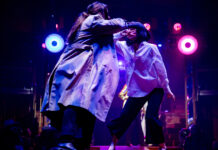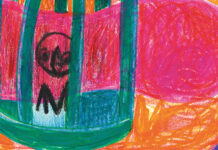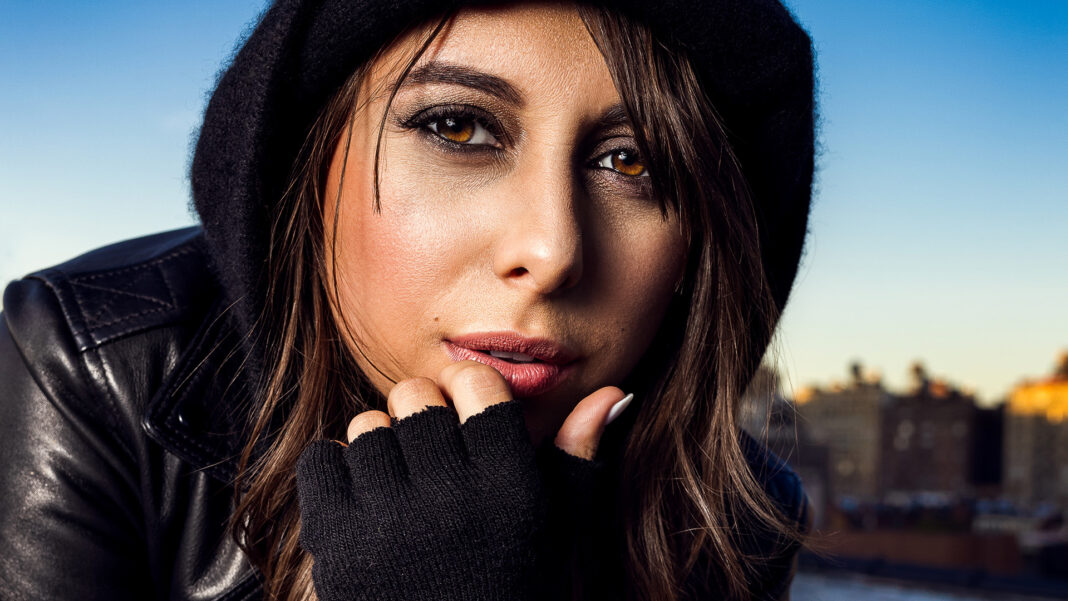
At the ripe old age of 25, vocalist Veronica Swift was praised by Giovanni Russonello in the New York Times for “her startling command and improbably mature delivery.” That was the year that her album Confessions was released. Her next album, This Bitter Earth, was completed in late 2019, but with the onslaught of the pandemic she decided it wasn’t the best time to release new work.
Earlier this year the album was finally released. Swift is now touring to support it with performances this week at the Newman Center in Denver on Friday, two sets at the Samueli Theater at the Segerstrom Center for the Arts in Costa Mesa on Saturday and a fourth performance at the Mondavi Center for the Performing Arts in Davis, California.
I discovered Swift when I first read about her shows at Segerstrom. That lead me to listen to three of her albums and I think she’s one of the finest young singers out there. One thing I admire is that she doesn’t fall into any one category. Her choice of material comes from the Great American Songbook, Broadway and bands you may never have heard of. What she does with all this material is to make each and every song completely her own.
Last week I spoke by phone with Swift about the record, her influences and the kind of songs that make her want to just sing. What follows are excerpts from that conversation that have been edited for length and clarity.
In 2019, you told San Francisco Jazz that for your previous album “each song on the album could be an entry from a diary.” When This Bitter Earth was recorded what does this audio diary reveal about who you were in that time and place?
This Bitter Earth, instead of it just being a continuation, it’s really a social commentary record. Not a political record, but it’s just a reaction to all the things that we’re experiencing in this ever-changing world. Things were coming up in the news that were just so upsetting. Rather than just taking an escapism approach, I wanted do a record that was just an artistic reaction and observation to all that.
Given the album’s delay due to COVID, how has your relationship to these songs and the way you perform them evolved?
All of these songs are completely different now, if not not in the way we play it, but the way I approach singing them. I had no idea what we were in for. But some of the material that the record had on it, it’s kind of some weird spiritual unveiling that happened. That’s why we held off to release it because it didn’t feel right to release any music and try to forward my career at a time when everyone was suffering so much. But after that, we kind of had a little glimpse into the future hope. That’s when I released the record, and it really reflects the songs well. It’s uncanny.
We’re not out of the woods on so many of the issues that inspired This Bitter Earth. Is it tough for you to remain optimistic?
I always call myself like a pessimistic optimist, but I think that’s being a product of my generation. My generation – just look at the pop music. I mean, it’s just all very dark. It’s just been going down a dark tunnel. The music is getting so evil and like giving up; all the songs are just about detaching from any kind of reality. And I want my music to inspire something else. I don’t want to have part of that.
How important is getting younger listeners to listen to what you and other artists do as you move on to greater success with your career?
It’s always important to listen to what’s out there. I get a lot of young singers and musicians that are always asking me, ‘What should I listen to?’ I just think there’s no answer to that. You just listen to who you like and then you figure out who they listen to, then figure out who is kind of doing that in your present contemporary time. Our job, if you’re a musician or deejay, you’re in that industry, is to listen to every possible thing out there, whether it had already been recorded years and years ago, or if it’s current.
My buddies, Cyrille (Aimeé) Cécile (McLorin Salvant), we all talk about how it’s amazing how different we all are, and we have completely different stories and tales to tell and a purpose. Between us there’s like so much history in there, but also like completely current. We definitely belong in this time period doing what we do.
The album ends with Sing, a song written and recorded by The Dresden Dolls 15 years ago. It’s a great recording and the song feels like it could have been written six months ago.
And it could have been written forty years years ago. I mean, that’s the beautiful thing about great music. The best music to me is timeless and ageless, especially with musicians that are inspired by music of different times. And that’s what I loved about that band. They were, you know, kind of like a mix between like hardcore punk mixed with like some 1930s old like Berlin cabaret and theater and this and that and jazz. There’s everything. But if you can make that a sound that is completely uniquely yours and write music also with this – this is like everything to me. A song that can transcend time. Like many of the great standards can. Many, not all. Many.
You spent four years performing as Frank ‘n’ Furter in The Rocky Horror Show in college. You’ve also stated a desire to play John Adams in a production of the musical 1776. How much does theater influence your performance style?
I can only hope to perform my fullest self for the audience. I don’t want to hold anything back. And for me, performance art and theater doesn’t have to mean you sacrifice a musical and artistic integrity of your musicianship or the lyric content. For me both enhance each other. It’s my dream to have props on stage and have the musicians be the characters – whatever the show we’re doing. Musical theater is always a huge part of my background. Whether you’re a musician or a writer everything comes down to story and narrative. And that’s why I like to call myself a storyteller more than a singer or a musician.
All photos by Matt Baker (Courtesy UnlimitedMyles)











